
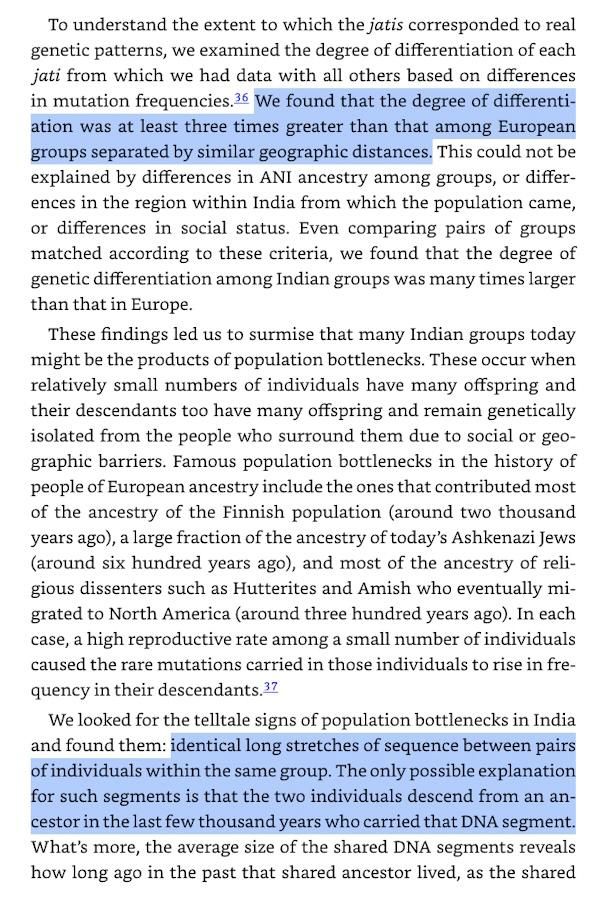
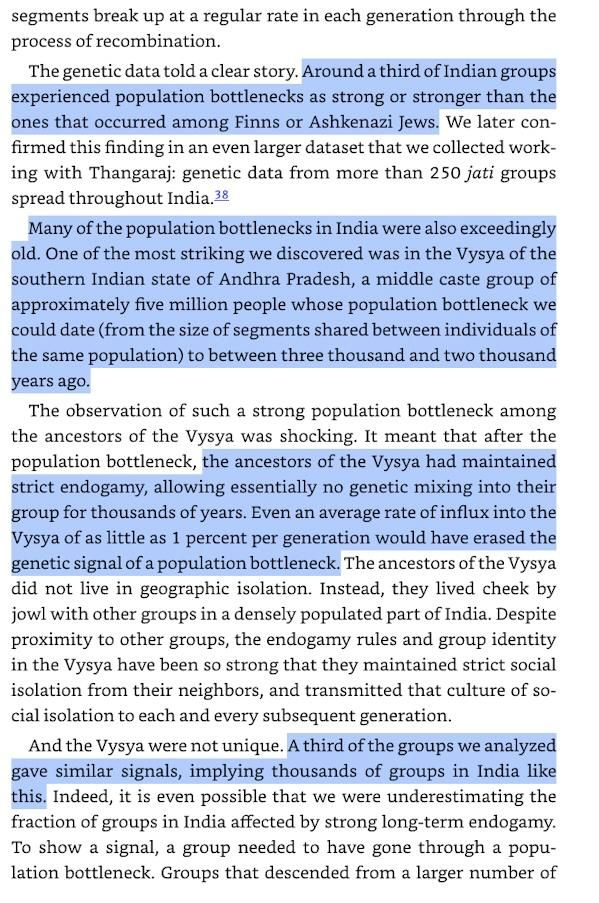
this is from David Reich
16.11.2025 19:02 — 👍 5 🔁 0 💬 1 📌 0@pseudoerasmus.bsky.social
I bleat about the history of global economic development https://pseudoerasmus.substack.com/ https://pseudoerasmus.com https://medium.com/@pseudoerasmus



this is from David Reich
16.11.2025 19:02 — 👍 5 🔁 0 💬 1 📌 0( Neither argues that caste was 'invented' in modern times, which is a strawman argument used by critics. They both acknowledge its antiquity. But they both argue caste identities were hardened / made less flexible in modern times )
16.11.2025 18:29 — 👍 4 🔁 0 💬 0 📌 0

In light of the genetic evidence about very long-run jati endogamy, what is the best case for the arguments put forth by Bayly and Dirks? I consider Bayly superior, but they both assume, as a matter of course, that caste identities had always been fluid in the pre-modern period without elaboration
16.11.2025 18:28 — 👍 9 🔁 1 💬 3 📌 0it's a pity because historians would learn so much from Mokyr using the clearest, most accessible prose ever. bsky.app/profile/pseu...
13.10.2025 15:45 — 👍 4 🔁 0 💬 1 📌 2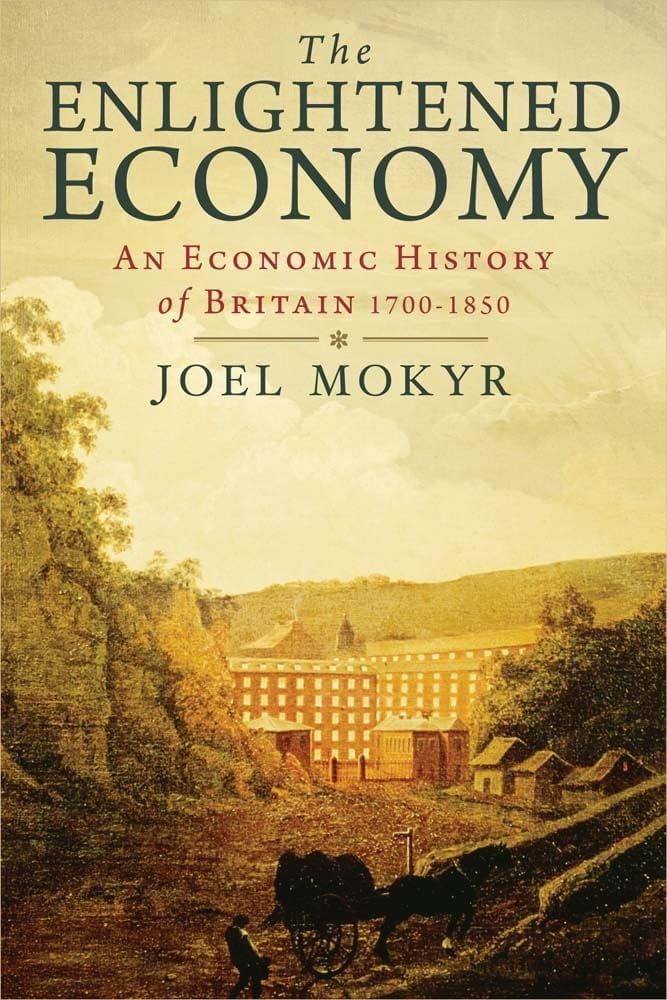
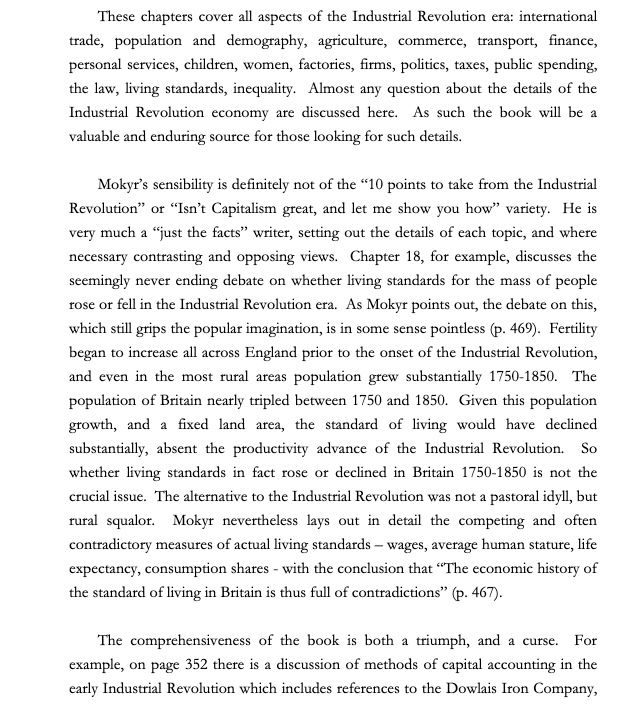

Many people are sceptical of Mokyr's idealist take on the Industrial Revolution, but even if you are suspicious, The Enlightened Economy is still a tremendous book. I think this review in JEL gives the correct flavour. It says the comprehensiveness is a curse, but the 'curse' teaches you a lot !!!
13.10.2025 15:44 — 👍 34 🔁 11 💬 0 📌 1re 'hard to measure and test'. Well, the institutions literature contains many big fundamental claims which are 'hard to measure and test' and they mostly did (as far as I'm concerned) empirical tests which settled nothing, or did tests so localised that their external validity is unknown.
13.10.2025 15:32 — 👍 3 🔁 0 💬 0 📌 0his views about the scientific revolution, the role of the enlightenment, are heavily sneered at by some historians. also more recently, he has delved into culture and cultural economics, which is more controversial. so these are the things I was referring to
13.10.2025 15:27 — 👍 6 🔁 0 💬 1 📌 0( Note bene: I mean, the sneers from non-economists. The quarter from which they normally hail at this time of the year. )
13.10.2025 15:26 — 👍 5 🔁 0 💬 0 📌 0from non-economists. all the sneers at Nobel econ time are from non-economists
13.10.2025 15:25 — 👍 6 🔁 0 💬 0 📌 0Not from economists! From historians! We're at Bluesky remember? ;-)
13.10.2025 15:25 — 👍 7 🔁 1 💬 2 📌 0bsky.app/profile/pseu...
13.10.2025 15:07 — 👍 0 🔁 0 💬 2 📌 1I am by nature a hate-poster. When I hate, I post far more extensively, far more volubly, than when I like, let alone when I love (🪢). Last year I disliked. This year I approve highly. So I won't be clogging up your feeds this year as I did last year ;-)
13.10.2025 14:07 — 👍 17 🔁 1 💬 0 📌 0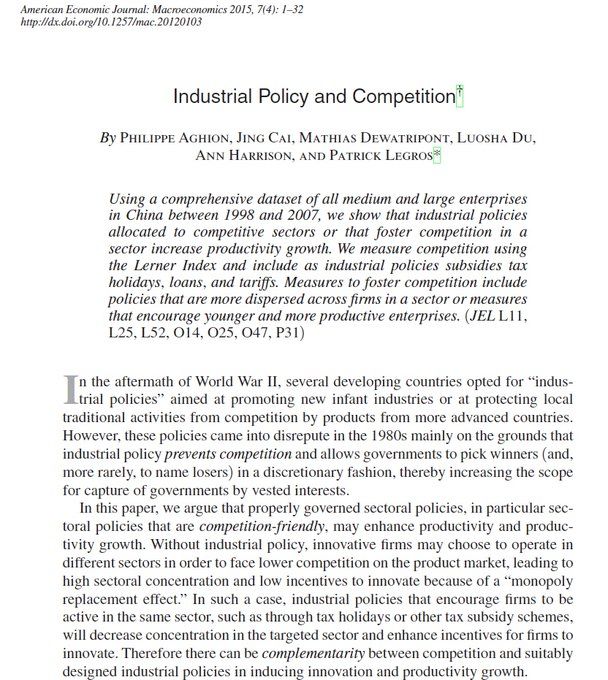
Aghion (et al) have a paper on China, they recognised long ago & before many that the Chinese model departs from the East Asia model in having a Darwinian struggle-to-the-death competition of firms behind a wall of protection. It pairs Schumpeterian growth theory w the economics of industrial policy
13.10.2025 13:42 — 👍 41 🔁 13 💬 1 📌 1The single biggest challenge to previous work on the 'why Europe?' question & which inspired a mountain of new work, came from Pomeranz, The Great Divergence, published by Princeton University Press. One of their bestsellers.
That was published in a series of which Mokyr has been editor in chief.
Indeed, against intellectual fashion, he asserted the very existence of the Scientific Revolution!
This militates against the bias of almost everyone (including economists and historians) to highlight the non-scientific origins of the modern world.
I anticipate some sneers thrown Mokyr's way so my preemptive comment...
What ever else he might have done, what ever faults he might have, Mokyr has performed a tremendous service simply by stressing the great importance of the Scientific Revolution to the birth of the modern economy.
So Mokyr's win in a way exemplifies @alvarolaparra.bsky.social's dictum:
The old Economic Historian's Dilemma: too economist to be a historian, too historian to be an economist ;-)
Mokyr's work could not have been done today in most economics departments, but the irony is that his work would not fit in history departments today, either. Methodologically he seems more 'history' than 'economics' to economists, but the content and reasoning are too 'economics' for most historians
13.10.2025 13:55 — 👍 67 🔁 18 💬 6 📌 1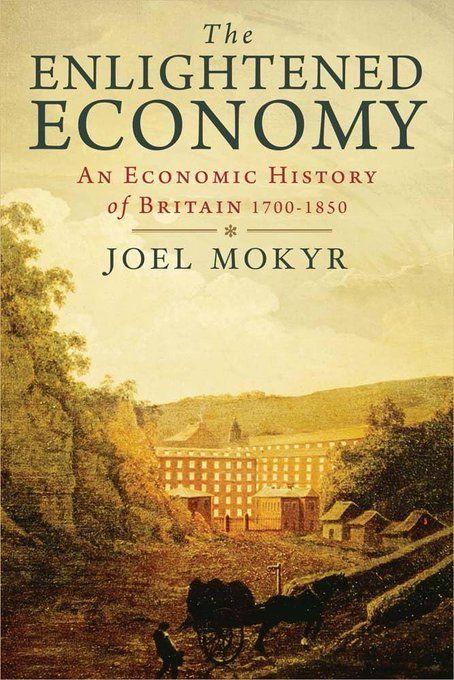



Four items by Mokyr: the first is a topic already recognised by the Nobel, but the other three are less well known areas of Mokyr: his study of the Irish famine, his explanation of why the Dutch Republic was not the first, and his artisan theory of the Industrial Revolution.
13.10.2025 13:54 — 👍 60 🔁 21 💬 0 📌 3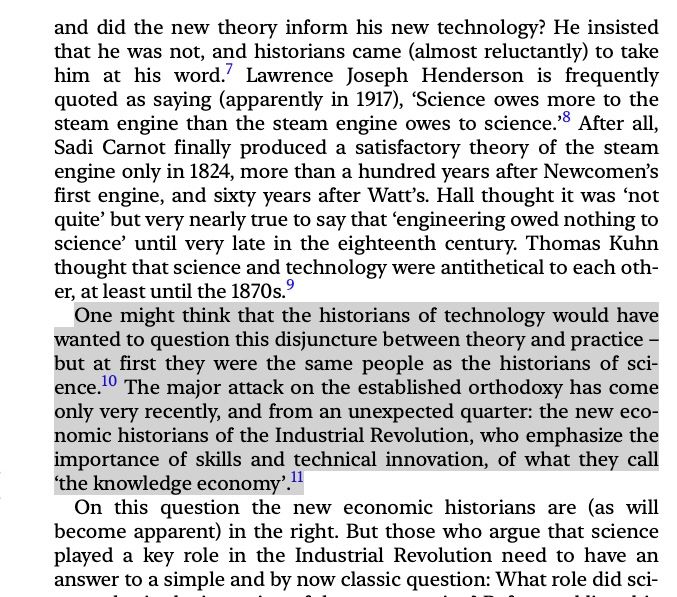
David Wootton, historian of science & author of The Invention of Science, which (in part) argues (contra the HoS orthodoxy) that science played an important part in the history of technology, credits Mokyr for resurrecting that argument. Footnote 11 takes you to 4 major works by Mokyr
13.10.2025 13:52 — 👍 28 🔁 7 💬 1 📌 0

I love the Aghion graduate growth theory textbook. There are many reasons, but one small one is that in Acemoglu's (left), developing countries merely import frontier tech & catch up, but in AGH (right) seemingly recognises actual history & suggests indigenous innovation is important à la East Asia
13.10.2025 13:50 — 👍 12 🔁 1 💬 0 📌 0I personally think Robert Allen, another economic historian of the British Industrial Revolution with a theory of innovation as well known as Mokyr's, and are complementary to Mokyr's, should have been included in the Nobel. But I recognise that they don't do fours ;-)
13.10.2025 13:44 — 👍 23 🔁 2 💬 0 📌 0
Aghion (et al) have a paper on China, they recognised long ago & before many that the Chinese model departs from the East Asia model in having a Darwinian struggle-to-the-death competition of firms behind a wall of protection. It pairs Schumpeterian growth theory w the economics of industrial policy
13.10.2025 13:42 — 👍 41 🔁 13 💬 1 📌 1anyway if Britain indirectly benefited from fighting all those wars (financial development, boost to arms industry, etc.) these benefits accrued because very few wars were actually fought on British soil !
23.09.2025 14:59 — 👍 6 🔁 0 💬 1 📌 0The vast majority of wars that Britain participated in (mostly through subsidies to other states) were a big waste of time & treasure because their aims went well beyond those narrow interests. And European wars were not good for British trade with Europe, period.
23.09.2025 14:58 — 👍 2 🔁 0 💬 1 📌 0the trade that mattered for Britain before the Industrial Revolution was the trade with America and with Western Europe. Protecting the trade with America required defending the American colonies prior to independence plus Jamaica/Barbados.
23.09.2025 14:57 — 👍 2 🔁 0 💬 1 📌 0precisely! though check out my clarification (a separate thread)
23.09.2025 14:26 — 👍 2 🔁 0 💬 0 📌 0IMO an important, but near totally neglected, reason that England was 'first' to undergo an industrial revolution, but continental industrialisation was delayed -- was precisely that so many wars were fought in 1500-1800 by European states on European soil.
23.09.2025 14:24 — 👍 12 🔁 1 💬 1 📌 0Did warfare drive the evolution of complex societies over thousands of years à la Morris or Turchin? -- YES
BUT did European wars in 1500-1800 advance or retard a country’s economic development relative to England?
My answer: RETARD
Does historical warfare (e.g., 1400-1900) predict high-capacity states in 2025? -- YES
Did warfare make the average European state more capable of extracting resources from its population than the Chinese state, ca 1800? -- YES